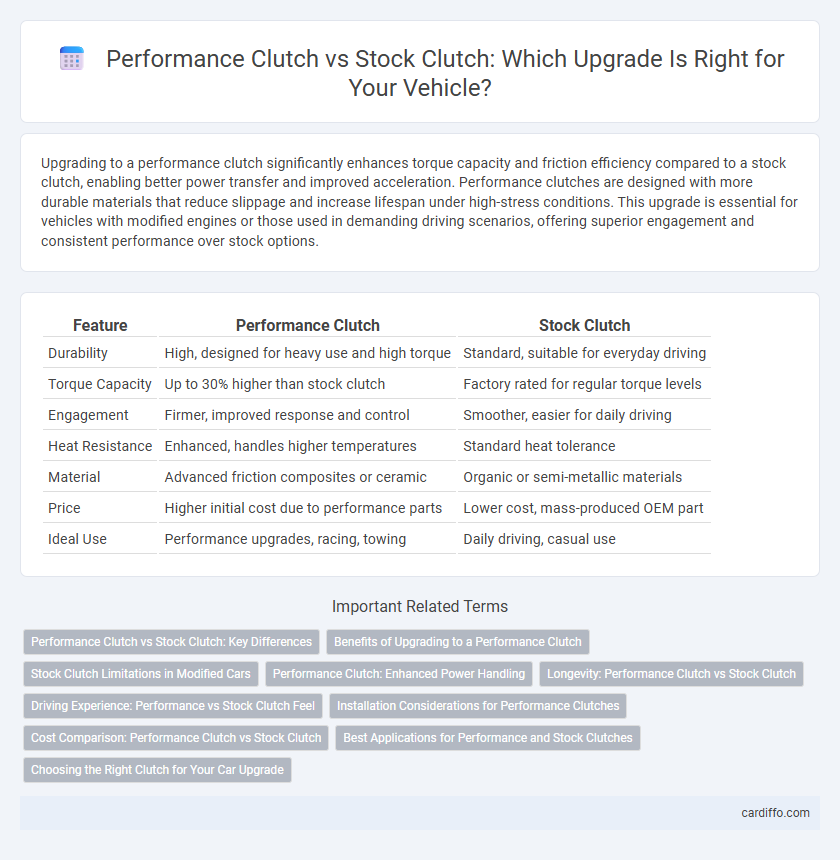Upgrading to a performance clutch significantly enhances torque capacity and friction efficiency compared to a stock clutch, enabling better power transfer and improved acceleration. Performance clutches are designed with more durable materials that reduce slippage and increase lifespan under high-stress conditions. This upgrade is essential for vehicles with modified engines or those used in demanding driving scenarios, offering superior engagement and consistent performance over stock options.
Table of Comparison
| Feature | Performance Clutch | Stock Clutch |
|---|---|---|
| Durability | High, designed for heavy use and high torque | Standard, suitable for everyday driving |
| Torque Capacity | Up to 30% higher than stock clutch | Factory rated for regular torque levels |
| Engagement | Firmer, improved response and control | Smoother, easier for daily driving |
| Heat Resistance | Enhanced, handles higher temperatures | Standard heat tolerance |
| Material | Advanced friction composites or ceramic | Organic or semi-metallic materials |
| Price | Higher initial cost due to performance parts | Lower cost, mass-produced OEM part |
| Ideal Use | Performance upgrades, racing, towing | Daily driving, casual use |
Performance Clutch vs Stock Clutch: Key Differences
Performance clutches offer enhanced torque capacity and heat resistance compared to stock clutches, making them ideal for high-performance driving or racing conditions. Unlike stock clutches, which are designed for everyday use and smoother engagement, performance clutches deliver quicker response and reduced slippage under heavy loads. The key differences lie in materials, pressure plate design, and friction surfaces, resulting in improved durability and consistent power transfer in performance clutches.
Benefits of Upgrading to a Performance Clutch
Upgrading to a performance clutch significantly enhances vehicle responsiveness and power transfer, resulting in smoother and quicker gear shifts compared to a stock clutch. The increased clamping force and improved friction materials of performance clutches provide better durability and resistance to heat, reducing slippage during aggressive driving or towing. This upgrade directly improves acceleration and overall drivability, maximizing engine performance and extending clutch lifespan under demanding conditions.
Stock Clutch Limitations in Modified Cars
Stock clutches often struggle to handle the increased torque and power output in modified cars, leading to premature wear and slippage. These factory-installed clutches use materials and designs optimized for standard engine performance, which limits their durability and grip under higher stress. Upgrading to a performance clutch enhances torque capacity, heat resistance, and engagement precision, mitigating the limitations of stock clutches in tuned vehicles.
Performance Clutch: Enhanced Power Handling
Performance clutches offer significantly enhanced power handling compared to stock clutches, enabling vehicles to manage higher torque outputs without slippage. They feature advanced friction materials and reinforced construction, which improve durability and heat dissipation during aggressive driving or racing conditions. Upgrading to a performance clutch ensures more efficient power transfer, resulting in quicker acceleration and improved overall driving performance.
Longevity: Performance Clutch vs Stock Clutch
Performance clutches typically offer greater longevity than stock clutches due to their high-quality materials and enhanced heat resistance, which reduce wear under aggressive driving conditions. Stock clutches, designed for everyday use, tend to wear out faster when subjected to increased torque or high RPMs frequently encountered in performance driving. Investing in a performance clutch can extend service intervals and maintain consistent engagement, making it a durable choice for enthusiasts seeking reliability.
Driving Experience: Performance vs Stock Clutch Feel
A performance clutch offers a more responsive and precise engagement compared to a stock clutch, enhancing throttle control and acceleration for spirited driving. The firmer pedal feel and quicker lock-up improve shift timing, making gear changes smoother and more predictable under aggressive driving conditions. In contrast, a stock clutch prioritizes comfort and ease of use, resulting in a softer engagement but less feedback and reduced performance at high RPMs.
Installation Considerations for Performance Clutches
Performance clutch installation requires careful alignment and often demands higher mechanical skill compared to stock clutches due to increased stiffness and pressure plate tension. Upgrading to a performance clutch may also necessitate modifications to the flywheel or transmission components to ensure compatibility and optimal function. Proper break-in procedures and torque specifications must be meticulously followed to prevent premature wear and ensure longevity in high-performance applications.
Cost Comparison: Performance Clutch vs Stock Clutch
Performance clutches typically cost between $300 and $700, significantly higher than stock clutches, which average around $150 to $300. While performance clutches require a larger upfront investment, they offer enhanced durability and improved power handling, reducing replacement frequency. Stock clutches are more budget-friendly initially but may wear out faster under high-stress driving conditions, potentially leading to increased long-term costs.
Best Applications for Performance and Stock Clutches
Performance clutches are ideal for high-torque applications, aggressive driving, and racing scenarios where enhanced grip and heat resistance are essential. Stock clutches suit daily commuting, light loads, and vehicles with standard power output due to their smooth engagement and longer lifespan. Choosing between performance and stock clutches depends on vehicle use, power demands, and driving style requirements.
Choosing the Right Clutch for Your Car Upgrade
Performance clutches offer improved torque capacity and faster engagement compared to stock clutches, making them ideal for high-performance vehicles or tuning upgrades. Selecting the right clutch depends on your car's power output, driving style, and intended use, ensuring compatibility with the transmission and engine modifications. Upgrading to a performance clutch can enhance acceleration, reduce slippage, and provide more consistent pedal feel under demanding conditions.
Performance Clutch vs Stock Clutch Infographic

 cardiffo.com
cardiffo.com